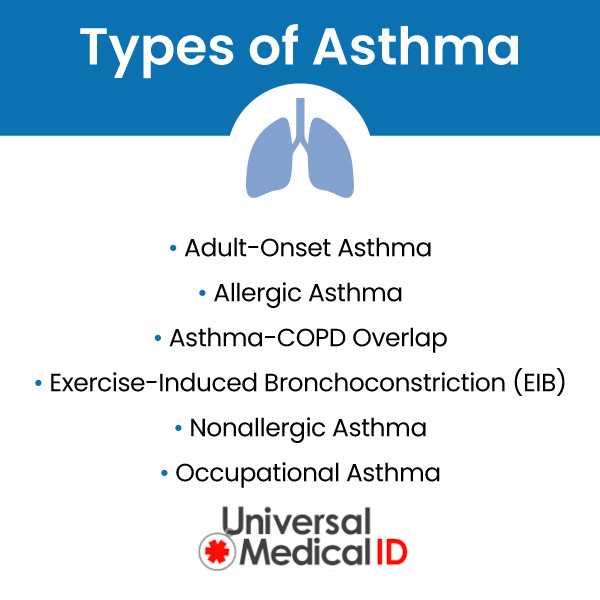

Medical IDs for Asthma
A medical ID is recommended for all types of asthma. Asthma is a chronic disease involving the airways in the lungs. When a person has asthma, their airways are always inflamed which can make it difficult to breathe.
According to the Asthma and Allergy Foundation of America, 1 in 13 people has asthma. A study shows that severe asthma inflicts a tremendous burden on patients with this disease, which is often invisible to others.
There are no immediate or apparent signs that a person has asthma. In an emergency, signs of asthma are not readily visible to responders unless a patient wears an asthma medical ID bracelet or necklace to alert others.
"If you have asthma or severe allergies, consider ordering and wearing a medical identification bracelet." - Asthma and Allergy Foundation of America
Types of Asthma
Not all asthma is the same. Different types of asthma can range from mild to severe forms of the disease. The type of asthma that a person has can have implications on how symptoms should be managed. In an emergency where every second count, a wearable medical ID can help identify the specific type of asthma that a person has.


Medical IDs and Asthma in Emergencies
Asthma attacks, also called asthma exacerbations, are a life-threatening emergency that requires quick action. According to Mayo Clinic, the key to stopping an asthma attack is recognising and treating an asthma flare-up early.
A medical ID is recommended for all types of asthma. Asthma is a chronic disease involving the airways in the lungs. When a person has asthma, their airways can inflame, which makes it difficult to breathe.
According to the CDC, over half a million people are hospitalized every year for Asthma related complications. Asthma also accounts for 1.8 million emergency department visits each year. Asthma is an invisible medical condition, often without visible symptoms making it difficult for responders to recognize in an emergency. Medical IDs alert others that asthma is present and avoid misdiagnosis.
There are no immediate or apparent signs that a person has asthma. In an emergency, signs of asthma are not readily visible to responders unless a patient wears an asthma medical ID bracelet or necklace to alert others.
"If your asthma is very severe, you may consider getting a medical ID bracelet that can alert first responders to your condition." – Healthline
What to put on an Asthma Medical ID


A medical ID for asthma can alert medical professionals of everything they need to know about your respiratory disease. Signs and symptoms of an asthma attack vary from person to person. Different patients may need different emergency treatments to manage and get an asthma attack under control.
A custom-engraved bracelet or necklace can alert others of accurate treatment that a person needs and who to call in an emergency.
Here are some of the most important items to put on an asthma medical ID:
- Name
- Asthma – you can include the type of asthma that you have and other medical conditions, related or not, such as COPD, heart disease, or allergies.
- Asthma medications – alert others if you carry asthma medications such as inhalers or the type of rescue medication that you need in an emergency. Example: "Inhaler in purse"
- Emergency Contact
"Be prepared if your asthma gets worse while you're away... Wear a medical alert bracelet or necklace with information about your asthma." - University of Rochester Medical Center

 - US
- US  - Canada
- Canada  - Australia
- Australia 
